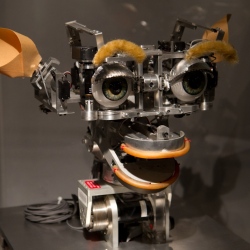
It’s called the A.I. XPrize presented by TED, a name that seems to say it all, but doesn’t quite. As announced last week, the competition is “a modern-day Turing test to be awarded to the first A.I. to walk or roll out on stage and present a TED Talk so compelling that it commands a standing ovation from you, the audience.”
The actual prize, however, is unspecified. And the rules presented are an example of what the contest might ultimately look like, based on ideas submitted by the general public.
Still, that one-sentence description, along with the sample rules, raise questions about the validity of the first artificial intelligence-related XPrize. What, if anything, does a machine-delivered TED Talk have to do with pushing the development of AI?
First, those sample rules. As the XPrize site specifies, “Elements of this concept may or may not be used,” but the details are nonetheless revealing. In the proposed scenario, teams would be given 100 discussion topics ahead of time. One of those topics would be selected (at random, or by the audience) at the TED conference, and the AI would have 30 minutes to come up with a 3 minute presentation. After the resulting TED Talk “the audience would vote with their applause and, if appropriate, with a standing ovation.”
Past XPrize competitions have involved fully empirical victory conditions, crossing a finish line first, or reaching suborbital altitudes twice in as many weeks. In this notional example, would collective decibel levels push a giant applause-meter toward the auditorium ceiling? And what if two robots get standing ovations at the same conference? Will organizers time the speed at which each ovation was achieved, or the howls emitted, or the tears produced?
Facetious as those questions might sound, the murky, talent-show mechanics are relevant to this next, and likely more challenging phase of the competition.
After the audience-rated TED Talk, the AI would have to answer two questions posed by Chris Andersen, former editor of Wired, and curator of the TED conferences. An expert panel would “add their votes.” This might be the tie-breaker for an ovation standoff. Or perhaps each expert’s applause will be magnified twenty-fold?
